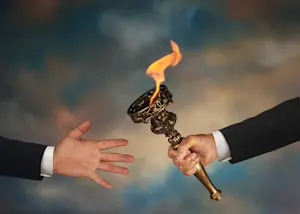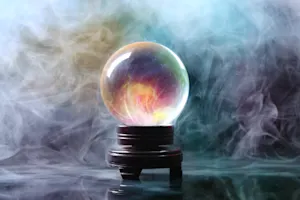What Makes This Word Tick
"Clairvoyant" has a mystical allure, often tied to the power of perceiving things beyond the normal range of the senses. Think of it as a peek behind the curtain of reality, claiming insights into events or truths yet unseen.
If Clairvoyant Were a Person…
Imagine a charming fortune teller with an air of mystery, adorned in flowing robes and a crystal ball in hand. This person might offer glimpses into the unknown, with an enigmatic smile that suggests they know more than they let on.
How This Word Has Changed Over Time
Once a term reserved for the spiritual seer or the mystical maven, "clairvoyant" has ventured into more metaphorical terrains. Nowadays, it can describe someone with remarkable foresight or those "in the know," be it in stock markets or fashion trends.
Old Sayings and Proverbs That Use Clairvoyant
While you won't find "clairvoyant" in ancient proverbs, its essence lives in phrases like "second sight" or "the gift of prophecy," which capture the human fascination with seeing beyond the here and now.
Surprising Facts About Clairvoyant
Did you know that "clairvoyant" comes from the French words "clair," meaning clear, and "voyant," meaning seeing? It's a linguistic reminder that at its heart, this word is all about clarity in vision, even if it's through a crystal ball.
Out and About With This Word
"Clairvoyant" pops up in settings where the mystical meets the mundane—think psychic fairs, horoscopes, and those times when someone jokingly predicts the plot twist of a movie.
Pop Culture Moments Where Clairvoyant Was Used
From the wise Professor Trelawney in "Harry Potter" to the enigmatic Miss Cleo of late-night infomercials, clairvoyants have been a staple in pop culture, enchanting audiences with their secrets.
The Word in Literature
Clairvoyant often finds its way into gothic novels and tales of intrigue, where characters see visions that spur on mysterious plots. Authors like Wilkie Collins and Stephen King have dabbled in these waters, knitting the mystical into conventional narratives.
Moments in History with Clairvoyant
The intrigue of clairvoyants played a role during times of uncertainty, like during World War II when even governments reportedly consulted them for foresight into the unknown.
This Word Around the World
In Japan, the term "yogen-sha" translates to "prophet," and in India, a "siddha" refers to one with spiritual insight. These words reflect similar concepts of perception beyond the ordinary—all part of the global allure of the clairvoyant.
Where Does It Come From?
As mentioned, "clairvoyant" traces back to French—"clair" (clear) and "voyant" (seeing). Its rise in English came in the 19th century, aligning with the spiritualism movements of that era.
How People Misuse This Word
Some might use "clairvoyant" casually to describe mere gut feelings or guesses, forgetting the word's mystical roots that imply something deeper and more innate.
Words It’s Often Confused With
Psychic: Both imply supernatural insight, but not all psychics are considered clairvoyant.
Prophetic: Implies predicting the future but often based on informed intuition rather than perceived sight.
Intuitive: This describes a more innate understanding that doesn't necessarily rely on supernatural foresight.
Additional Synonyms and Antonyms
Synonyms include: telepathic, mystic, seer. Antonyms might be: unaware, oblivious, ignorant.
Want to Try It Out in a Sentence?
"While at the carnival, we visited a clairvoyant who hinted at a surprising adventure on our horizon."
















